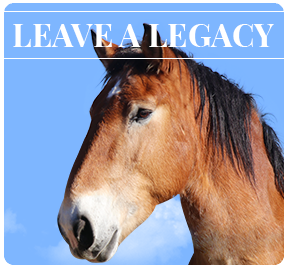Equine Voices Rescue & Sanctuary’s Humane Euthanasia Fund
Our euthanasia fund has been set up to help individuals who cannot afford to humanely euthanize their horses. Donna Rice, our first donor recipient euthanized her two quarter horses after they battled health problems. Our mission is to educate the public about the difference between humane euthanasia vs. horse slaughter. For more information on humane euthanasia vs. horse slaughter log on to www.vetsforequinewelfare.org or continue reading below.
Donate on-line: Donate through a secure internet transaction with a credit card. Click on the button below.
Donations to Equine Voices are tax deductible.
Please help us by supporting this very important fund, and help us help others make the right decision on behalf of their beloved equines. Your donations are desperately needed and appreciated!
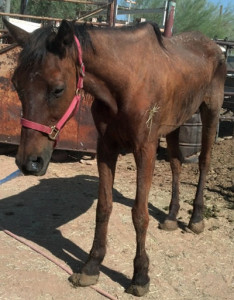
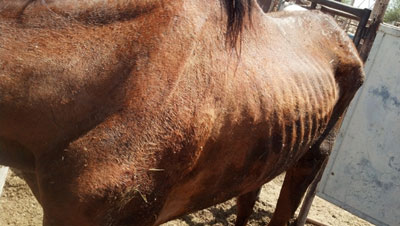
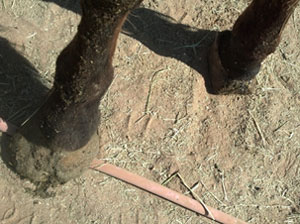
Her Name was “Indian Sunrise”
By Gwen Cleary
There have been few things in life that have surprised me, and when I was approached recently about a “down” thoroughbred, I admit I was not prepared for what I saw. In a cattle pen before me lay a horse that was so emaciated, I could hardly speak. You could tell it was a horse, but beyond that, it was anyone’s guess as to what kind. I entered the pen and moved her to see if she could get up, and to my surprise, she did…. and what I saw next was horrifying. Her foot had been cut off, and she obviously suffered from severe founder… she stood, but barely. She gobbled the hay I put before her and I looked into her feces-soaked eyes. The pain on her face was excruciating. She had flies all over her, biting flies, and she was lying in her own urine, probably unwilling or not wanting to get up due to the pain. All I could think of at the time was to get a fly mask on her. I knew I had to get her away from this awful man, somehow. I was trying to think of ways that I could help her, help this poor sweet soul.
The temperature was heating up and whatever I was going to do had to be quick. For now I had to leave her behind, leave her with this terrible man, but the idea of helping her drove me on. People have a choice, animals in our care don’t, they depend on us to take care of them. It was so difficult to leave her that my gut hurt, but I had to, and I immediately emailed Karen Pomroy, founder of Equine Voices, who volunteered to help through her euthanasia fund. It was now just a matter of getting this awful man to sign her over, to put her in Equine Voices name, so we could do what should be done. I checked on her and brought her a bale of Bermuda hay. She was in such pain but still allowed me and loved having me stroke her neck. I told her it would soon be over, to hang on.
I finally got the call I had been waiting for….4 days had gone by and I was finally given rights to the horse! With the help of Equine Voices and Best Friends Animal Society, there were enough funds to help this suffering mare. I called Dr. David Olsen and also Peggy Reed from “The Last Ride” and coordinated an effort to come and put this poor girl to sleep peacefully. The prognosis was as we thought, she was too emaciated and her feet were too far gone for her to be saved, she had to be put down. But, I was determined that it should be done peacefully with reverence, respect, and grace. The abuse and cruelty this horse had endured would soon be over; her lack of respect would soon end. Dr. Olsen who has seen everything was even horrified and told me that a horse in this condition doesn’t die very quickly, not only had she suffered her entire life, she was going to suffer somewhat on her way across the rainbow bridge due to the limited function of her debilitated organs. She gasped a little for air, but was finally gone, we stroked her head and face…. Dr. Olsen was kind and gentle. Finally she was at peace. The tattoo on her lip, D21335 proved she was a former racehorse. Her name was Indian Sunrise…. found on the reservation, grand-daughter of the great “Pleasant Colony”, a triple crown contender, and daughter of the horse “Don’t Forget Me”…I certainly won’t forget her, hopefully neither will you…
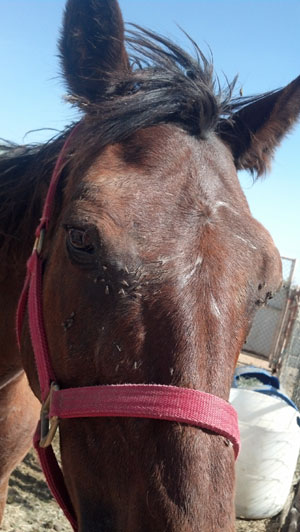 The Equine Voices Euthanasia fund was designed to assist loving horse guardians with sufficient funds to humanely euthanize their horse, to supply them with funds necessary to respectfully end their companion’s life when the equine has an incurable disease or is in intense pain. This fund was also designed to help horses like “Indian Sunrise” and has so far helped 23 horses pass in dignity.
The Equine Voices Euthanasia fund was designed to assist loving horse guardians with sufficient funds to humanely euthanize their horse, to supply them with funds necessary to respectfully end their companion’s life when the equine has an incurable disease or is in intense pain. This fund was also designed to help horses like “Indian Sunrise” and has so far helped 23 horses pass in dignity.
To donate to our Euthanasia Fund please send your tax-deductible donation to: (Please mark for Euthanasia Fund)
Equine VoicesPO Box 1685, Green Valley, AZ 85622
Or if you would like to donate online, click here:
Thank you for helping us help them!
Humane Euthanasia vs. Slaughter
Some pro-horse slaughter opponents of the American Horse Slaughter Prevention Act like to equate horse slaughter with humane euthanasia. Nothing could be further from the truth. Horse slaughter is a horrific process that involves immense cruelty and animal suffering. It is not humane euthanasia. To quote Veterinarians for Equine Welfare:
“It is the united opinion of VEW that horse slaughter is inhumane, and that it is an unacceptable way to end a horse’s life under any circumstance. One need only observe horse slaughter to see that it is a far cry from genuine humane euthanasia. From the transport of horses on inappropriate conveyances for long periods of time without food, water of rest to the very ugly slaughter process in which horses react with pain and fear, no evidence exists to support the claim that horse slaughter is a form of humane euthanasia. Rather, it is a brutal process that results in very tangible and easily observable equine suffering.
It is worth noting that the suffering of horses in slaughter is accentuated by the very fact that they are not raised for slaughter. Horses going to slaughter have largely been accustomed to close human contact whether through racing, ranch work, pleasure riding, rodeo or any of the other ways in which horses are used in this country. While some are purposely sold into slaughter by their owners most end up at the abattoir through pure bad luck: they were sold at auction and the winning bidder was a ‘killer-buyer’ working for one of the slaughter plants. To suddenly be treated as pure livestock must be disorienting and frightful, and can only compound their suffering as they proceed to slaughter.
We believe that it is an unethical and dangerous practice for the American Veterinary Medical Association (AVMA) and American Association of Equine Practitioners (AAEP) to attempt to equate horse slaughter with humane euthanasia.”
From “Horse Slaughter – Its Ethical Impact and Subsequent Response of the Veterinary Profession”, by Veterinarians for Equine Welfare (2008)
Veterinarian-administered euthanasia via chemical injection, on the other hand, brings a peaceful end to life. Normally, a veterinarian can come to the horse’s home so that the animal can be in familiar surroundings with loving caretakers there or nearby. Some vets will pre-sedate the horse before administering a lethal dose of Sodium Pentobarbital, which brings a quick, painless death. After death, the horse’s carcass can be buried (ordinances permitting), transferred to a landfill, rendered or – increasingly – cremated. While cremation can be expensive, the average cost of having a horse humanely euthanized by a veterinarian and its body disposed of is approximately $225 – a virtual drop in the bucket when it comes to the overall expense of keeping a horse. This cost is simply a part of responsible horse ownership.
Harley’s Heritage – Heartbreak and Hope Not One Moment More
Monday, May 5, 2008
I have only seen one other horse more emaciated than Harley. A mare, so weak she could only raise her head high enough off the ground to drink from the bucket of water that was offered to her as she lay in the depression made by her body. She had struggled to get up, probably for weeks from the looks of the dirt mounded around her body. Lying in the filthy mud, every bone in her body was visible. Head and neck resting flat out on the ground, she somehow managed to pick up bits of hay in her mouth and chew. It is an image I had hoped to never see again, and also knew I would never forget.
The image returned today. The Tucson Police Department had responded to an emergency call about a severely malnourished horse. With the officers now on the property, the owner stated he had “tried lots of different feeds and hay but just couldn’t bring the horse back.” He also stated he did not have the finances to now euthanize the horse or provide veterinary care.
With Law Enforcement now involved, the owner was willing to relinquish the horse to a rescue organization. The officer was seeking immediate care and assistance. Could Equine Voices please help?
Thankfully, Karen Pomroy had a vision, a fund to provide assistance to owners financially unable to provide a dignified and painless end of life for their equine companion. This is how the Equine Voices Euthanasia Fund was born.
Racing across town to meet the officers, the owner, and the Vet, every moment at every stoplight was used to write the transfer of ownership to the Sanctuary. With that done, decisions in the best interest of the horse could be made. A medical evaluation and a look in to the horse’s eyes would determine if recuperation might be possible, or if it was time for a dignified and painless end.
Based on the police officer’s description, I tried to mentally prepare myself before I arrived. The directions from the officer were clear, look for “the hideous” stable off of X Street. Even with mental preparation I had to swallow the lump in my throat as I walked in to his pen.
An old sorrel gelding stood stoically in his own waste in a corner of a dilapidated, filthy, fly infested hellhole of a place someone dares to call a stable. Approaching from behind, I remember thinking I had never seen such an emaciated horse actually standing up. Every bone was visible. Matted and dirty, he bore the scars of ill- fitting saddles, evidenced by two large white spots on either side of the wither. Flies swarmed in both his eyes, and the lower lids were droopy and swollen. He was frightened but settled as I stroked him and told him how beautiful he was. His name was Harley. The prognosis was very, very poor. Based on Harley’s physical condition and his age, the Vet felt it would be best to put him down and I would now have to decide Harley’s fate.
There was no hesitation. As the Vet made preparations, I stroked his matted coat and apologized to him for human ignorance, and hoped that his next encounter with humans would not be so difficult to endure. This was the heartbreak of Harley. He had seen and experienced the best of the worst in the human race. How long would it have gone on if someone had not called the police?
A tranquilizer was given to calm Harley before the lethal injection would be administered. I walked him over to a shady spot by a tree, away from the filth of his pen. Even in the last moments of his life, plans had to be made to have his body accessible for removal from the property. He was calm as I stroked his muzzle and rubbed his neck while the Vet injected the lethal dose. It took only a moment. The Vet skillfully guided Harley’s body down for his final rest. He left us peacefully, without a struggle, and with dignity. I knelt beside him and kissed his muzzle, telling him to go gallop off to greener pastures as I stroked his soft ears. Tears fell on Harley’s face and neck as I wept for the suffering he had endured.
Harley died better than he had lived. He died surrounded by people who cared; a stranger from a Sanctuary, a compassionate police officer who went to the effort to find and ask for help, and a caring Vet. This is the hope of Harley’s Heritage. There are people who care. Someone called in about Harley’s condition. The generosity of people who donated to the Euthanasia Fund, and assistance from the Art for Animals Foundation met Harley’s last needs.
The very next day- another phone call, another request for help with a horse that was crippled, rapidly losing weight, and going downhill. Could we please help? It was almost prophetic after Eight Belles demise on the racetrack. Here was another racetrack tragedy: a five-year-old gelding who got hung up in the starting gate at his last race. The left front knee was rigid and inflexible with a terrible injury, along with a misshapen jaw with the lower front teeth jutting off in obscure angles and crossing over each other. The horse was given to the current owner with the hopes of recuperating enough to become a saddle horse. He was now caught in a broken family situation, crippled from his racing days, and left in the hands of a family member who “doesn’t even like animals”. A “friend” had suggested sending the horse to Mexico to be slaughtered. Thankfully, the owner had instead called for help. Now the funds to answer the call must be found.
It takes money to provide help in these situations. Working together with law enforcement, Equine Voices is helping define where best to assist in tragic situations like these. When the calls come, will we be able to answer yes? You can help Equine Voices with our commitment: Not one moment more of unnecessary suffering, hunger, or inadequate care. The Euthanasia Fund can assist when there are no other options.
Donations to Equine Voices may be designated for the Euthanasia Fund and are tax deductible. Thank you for sharing our vision: Not one moment more.
Animals’ Angels photo grab from Beltex grisliest ever WARNING: GRAPHIC PHOTOS




